![]()
GENO AURIEMMA’S FIRST CHAMPIONSHIP TROPHY AND PAT SUMMITT’S 1,000TH VICTORY BALL
For 12 years, it was a wonderfully nasty rivalry. When the women of the Universities of Connecticut and Tennessee played basketball against each other, the stakes were always high, the games often close.
A few months after their first nationally televised clash in January 1995, the UConn Huskies brushed the Lady Vols aside, 70–64, to complete an undefeated season and win the team’s first national championship (see trophy on page 253). The following year Tennessee got a most satisfying revenge, beating UConn in overtime in the Final Four, in one of the greatest games in hoops history. Four times, the teams met in the National Collegiate Athletic Association final; four times, UConn won.
Then there were the coaches, two of the legends of the sport. Geno Auriemma of UConn and Pat Summitt of Tennessee began as relatively friendly rivals but became relatively unfriendly ones, to the extent that in 2007, Summitt canceled all regular-season games. She suspected UConn was committing recruiting violations;1 she was also upset that Auriemma had called her Lady Vols the “evil empire.” Since then, the teams have only met in the NCAA tournament.
Of course the two coaches had a great deal in common. “We both lived the game,” Summitt would write, “as if it was in us on a cellular level.”2 Both were brilliant, intense, dedicated coaches who did not tolerate fools, bad officiating, stupid questions, or sloppy play. They both had exemplary records when it came to the academic accomplishments of their players. Both were natural alphas, not inclined to cede, or share, status as leaders of the sport.
Born on a family farm in rural Tennessee, Pat Head Summitt was raised on a diet of hard work and rectitude. Her career covered the entire modern history of women’s hoops. She grew up with the six-player, half-court game in high school and played in the first national college tournament as well as on the first US Olympic team, which won the silver medal in 1976.

Hired to coach Tennessee in 1974, she was paid $250, and also did the laundry and drove the team van. To pay for new uniforms, the team sold doughnuts.3 But Summitt began to build a reputation; in 1984, she coached the US Olympic team to a gold medal. By then she had perfected The Stare, a piercing look that was intimidating even to see on television.
In her 38-year tenure as head coach (1974–2012), Summitt never had a losing season. Her teams made every NCAA tournament, winning the national championship six times between 1987 and 1998—including the last three in a row. She began to be referred to as the “John Wooden of women’s basketball”; Wooden won 10 titles with UCLA from 1964 to 1975. In 2009 Summitt became the first Division I hoops coach to win 1,000 games, an achievement commemorated with this ball. By the time she retired in 2012, she had won more games (1,098) than any other basketball coach, male or female; gone to 18 Final Fours; and won eight titles. From 1985 to February 2016, the Lady Vols were never out of the top 25—a record 565 weeks.4 In 2000 she was named the Naismith Women’s Collegiate Coach of the Century; John Wooden won the award for men.
Auriemma comes from a very different background. He emigrated from Italy as a boy and grew up outside Philadelphia. His first college coaching job was as an assistant for the women’s team at St Joseph’s in Philadelphia; his sense of humor is spiked with distinctly Philly barbs. He also worked at Immaculata coach Cathy Rush’s (see 1972 Immaculata Mighty Macs entry) summer hoops camps;5 Rush helped him get the post as an assistant at the elite University of Virginia women’s program. After four years he was ready to run his own show and became head coach at UConn in 1985. Those Huskies were a hangdog bunch, with only one winning season in 11 years. By 1991 they were in the Final Four, and in 1995 they won it all. Huskies teams have gone undefeated five more times under Auriemma, at one point winning 90 games in a row, breaking Wooden’s record of 88.6 He also coached the American women to gold in the 2012 Olympics. In 2016, the Huskies won their fourth title in a row, and eleventh under Auriemma, breaking Wooden’s record, and appear primed to keep going.
UConn–Tennessee is the only women’s team rivalry that has approached anything like the intensity and interest characteristic of those in the men’s game, such as Duke–North Carolina. Summitt herself referred to it as an “absolute masterpiece.”7 Like any great rivalry, UConn and Tennessee pushed each other, and the game itself, to greater excellence. From 1995 to 2010, one or the other won 12 of 16 NCAA championships, and all but two Final Fours over that period featured at least one of them.

The contest has lost some of its edge because UConn has been so dominant of late; Tennessee hasn’t won since 2008. The renewed friendship between Auriemma and Summitt has also taken the venom out of it. But the most important reason it will never be the same is that Summitt will not be part of it. In 2011, at age 59, she was diagnosed with early onset Alzheimer’s. She retired after that season—a personal tragedy and a terrible loss to the game she loved. When she died in June 2016, all of basketball—and all of Tennessee—mourned. Pat Summitt was, literally, a game-changer.